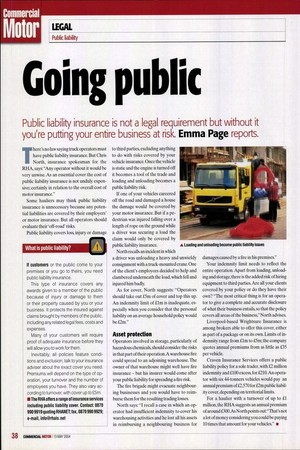Going public Public liability insurance is not a legal requirement but without it
Page 38

If you've noticed an error in this article please click here to report it so we can fix it.
you're putting your entire business at risk. Emma Page reports.
There's no law saying truck operators must have public liability insurance. But Chris North, insurance spokesman for the RHA, says: "Any operator without it would be very unwise. As an essential cover the cost of public liability insurance is not unduly expensive; certainly in relation to the overall cost of motor insurance."
Some hauliers may think public liability insurance is unnecessary because any potential liabilities are covered by their employers' or motor insurance. But all operators should evaluate their `off-road' risks. Public liability covers loss, injury or damage
to third parties, excluding anything to do with risks covered by your vehicle insurance. Once the vehicle is static and the engine is turned off it becomes a tool of the trade and loading and unloading becomes a public liability risk.
If one of your vehicles careered off the road and damaged a house the damage would be covered by your motor insurance. But if a pedestrian was injured falling over a length of rope on the pound while a driver was securing a load the claim would only be covered by public liability insurance. North recalls an incident in which
a driver was unloading a heavy and unwieldy consignment with a truck-mounted crane. One of the client's employees decided to help and clambered underneath the load, which fell and injured him badly.
As for cover, North suggests: "Operators should take out £5m of cover and top this up. An indemnity limit of £1m is inadequate, especially when you consider that the personal liability on an average household policy would be £2m." Asset protection
Operators involved in storage, particularly of hazardous chemicals, should consider the risks in that part of their operation.A warehouse fire could spread to an adjoining warehouse. The owner of that warehouse might well have fire insurance — but his insurer would come after your public liability for spreading a fire risk.
The fire brigade might evacuate neighbouring businesses and you would have to reimburse them for the resulting trading losses. North says: "I recall a case in which an operator had insufficient indemnity to cover his warehousing activities and he lost all his assets in reimbursing a neighbouring business for
damages caused by a fire in his premises?'
Your indemnity limit needs to reflect the entire operation. Apart from loading, unloading and storage, there is the added risk of hiring equipment to third parties. Are all your clients covered by your policy or do they have their own? "The most critical thing is for an operator to give a complete and accurate disclosure of what their business entails, so that the policy covers all areas of the business," North advises.
Liverpool-based Wrightsure Insurance is among brokers able to offer this cover, either as part of a package or on its own. Limits of indemnity range from £1m to £5m; the company quotes annual premiums from as little as £35 per vehicle.
Craven Insurance Services offers a public liability policy for a sole trader, with £2 million indemnity and £100 excess, for £210. An operator with six 44-tonners vehicles would pay an annual premium of £2,570 for £2m public liability cover, depending on territorial limits. For a haulier with a turnover of up to £1 million, the RHA suggests an annual premium of around £300 As North points out:"That's not a lot of money considering you could be paying 10 times that amount for your vehicles." •
What is public liability?
It customers or the public come to your premises or you go to theirs, you need public liability insurance.
This type of insurance covers any awards given to a member of the public because of injury or damage to them or their property caused by you or your business. It protects the insured against claims brought by members of the public, including any related legal fees, costs and expenses.
Many of your customers will require proof of adequate insurance before they will allow you to work for them. Inevitably, all policies feature conditions and exclusion; talk to your insurance adviser about the exact cover you need. Premiums will depend on the type of operation, your turnover and the number of employees you have. They also vary according to turnover, with cover up to E5m. II The RHA offers a range of insurance services Including public liability cover. Contact: 0870 990 9919 quoting RHANET; fax, 0870 990 9929; e-mail, info@rhais.net




















































































































































































































